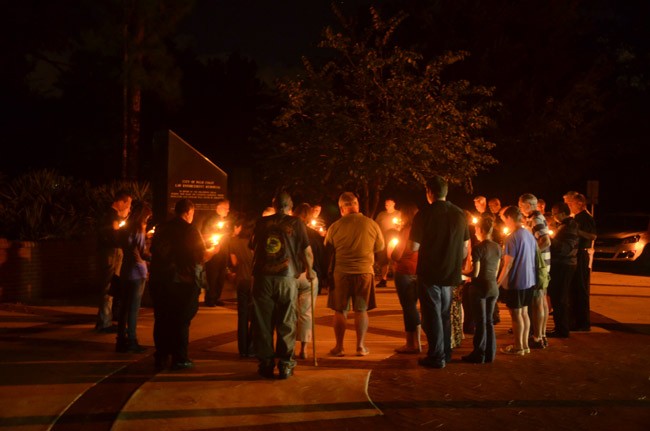
About two dozen candles flickered in the humid air Tuesday evening at Heroes Park in Palm Coast as the friends, family and colleagues of a fallen sheriff’s deputy formed a semi-circle around the law enforcement memorial’s black granite. They spoke a few words in the deputy’s memory, said two prayers, and sang “Amazing Grace” a few steps from the tree where he had taken his life.
Joe Delarosby was being remembered and missed on the first anniversary of his death, with grief barely less acute than it was last October.
“There isn’t a day that goes by that I don’t remember him laugh at the good times and cry at some of the bad,” his friend, Sgt. Michael van Buren, who organized the memorial with Patrick Juliano, said before speaking a prayer. “We really had planned this as a small, informal gathering, and on behalf of myself and Judy and Kelsey,” he said, referring to Delarosby’s wife and one of his daughters, “we greatly do appreciate each and every one of you that took the time to come out and remember those good times with Joe, sharing your memories with one another. Under our watch, you will never be forgotten.”
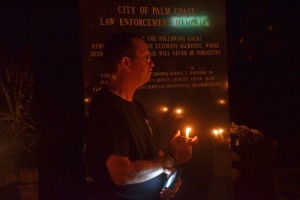
To Delarosby, his identity was his job: he’d been a Flagler County Sheriff’s deputy for 19 years. He’d been decorated many times. He’d been, ironically—as former Sheriff Don Fleming, who was at the memorial, noted—the deputy everyone turned to when one of their own was killed or died: Delarosby took on the organization of funerals as if each death was a personal loss. He had a personality as unforgettable as his lanky frame, the sort of personality that could make fun of his elongated, Beeker-like face, that bore smiles as broad as the Flagler Bech pier—a pier that was his second home on so many dawns, for him and his camera–and that didn’t pass up whatever practical joke he could pull off on his colleagues. His wife Judy and a few others Tuesday evening wore t-shirts bearing an image of Delarosby as Beeker.
Like most people, he had a dark side. Some people keep it under control. He did. And he didn’t. He tried, and it didn’t always work. He’d been reassigned. He’d been counseled and treated. He’d found himself locked in a bathroom once threatening to kill himself and was briefly committed to a psychiatric unit. Three months later he was pressured into resigning from the sheriff’s office, which would later claim it had done all it could to help him. His leaving the job was dubbed a resignation.
It took on a much grimmer dimension. It took place within days of the suicide of Robin Williams—a world-renown jokester with a dark side the size of his world. Delarosby’s letter was signed in mid-July. His “retirement” began on Aug. 11, 2014, the day Williams hung himself.
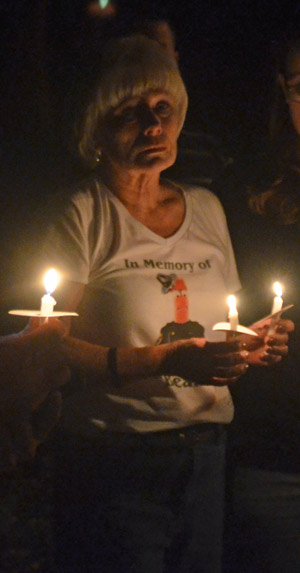
Eight weeks later Delarosby drove to Heroes Park and ended it for himself with one of his weapons, by a tree. Those who knew him say he didn’t choose October 7 by coincidence. In police lingo, 10-7 means going out of service. End of shift.
It wasn’t easy for his parents, Robert and Carolyn, to make it to the memorial: it’d been weeks since Robert had been able to go out. He was in a wheel chair. He’d gone through what he described as “another bout of cancer” since his son’s death, a year he described as “long and sad.”
“I miss Joe every singe day. I do. Every day,” Carolyn Delarosby said, her voice breaking. “He was the most wonderful son. He really, truly was.”
The two or three dozen people had begun gathering at the park as light fell around 7 p.m. They gathered in small groups, speaking memories in murmurs and every little while breaking away from one group to go to another, or to hug Judy or Joe’s parents. When it was dark small candles were distributed, then one was lit, and very quickly all were lit. John Pollinger, the former police chief and candidate for sheriff who’d met Delarosby at the funeral of Sgt. Frankie Celico in 2011, compared the propagation of flickers to Delarosby’s effects on his community: it could spread just like that.
“I don’t believe that anybody can understand the depth of despair that someone is in when they reach this point, and it’s for nobody to judge about the person,” Pollinger said. “Someone takes their life, it’s that moment that they can’t be rescued. It happened in my department, it’s happened in my career with people I’ve known, and the only thing you can do is let the family grieve as much as they need to grieve, and I see that with Judy and the family, it’s exactly what’s going on a year later. Joe was there for everybody, I think when he left the job, he lost his identity. That’s who he was. He was a deputy sheriff for Flagler County. I don’t think you could have done anything more to him than take away his badge and his uniform.”
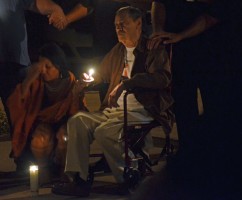
Fleming, who’d been sheriff between 2004 and 2012—and who’s running for the office again, with Pollinger as an advisor—recalled his years with Delarosby. “Joe was a good police officer. He did the job when he had to do the job,” Fleming said. “He had some issues. We dealt with them. Put him into counseling, when he came out of counseling we put him into a job that wasn’t as stressful, and he did a good job for me there. You just try to stay on top of them, talk to them, make sure everything is OK. That was the way it was. As long as Joe had the car and the badge, he was fine—and the camera. He took some good pictures.”
The gathering was a live version of the memorial Facebook page established in Delaroseby’s memory: no man or woman was without a Joe story or a recollection of some sort. For Joe Vece, it was Delarosby’s help getting the annual 9/11 motorcycle memorial ride off the ground, an event Vece started in 2006 when he was with the Red Knights Motorcycle Club and has continued with the Knights Inferno, and who’d do ride-alongs in Delarosby’s patrol car on Friday nights. “I can’t believe that we’re here tonight for the reason we are. He was a pillar in the community,” Vece said.

To Delarosby’s long-time friend Patrick Juliano, who stood next to Judy at the funeral a year ago, it was about how Judy—who’d preferred not to speak publicly Tuesday evening—had made it through the year. He described her as a rock. “You go through days where you have good days, you’re strong, then you have that one day where it’s like—it’s hard,” Juliano said. “She has a lot of family and friends, extended family and friends here that have really been by her and helping her cope .”
No one mentioned what had taken place only a few days before at heroes Park—the standoff between deputies and former Flagler Beach police officer Tim Sturman, who was threatening to shoot himself with a shotgun. In that case, deputies were tipped off to Sturman’s intentions, and after a tense 90 minutes during which Sturman came close to ending it, he surrendered. He, too, had “retired” from his police department just two months earlier.
After the memorial Tuesday evening, Tabitha Fletcher, Delarosby’s daughter who could not make it to the memorial, wrote a note on his memorial page: “Thank you Judy for holding a candle for me. I’m sorry I couldn’t be there with you all. I lit a candle next to his picture tonight. Thank you for your prayers.”
![]()
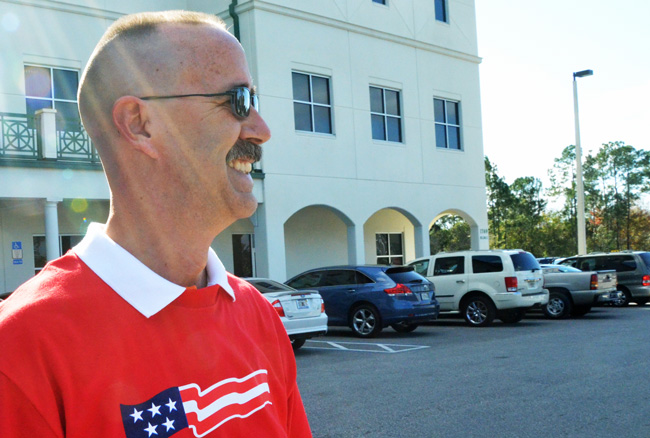





























Samuel L. Bronkowitz says
I think that with the stresses of police work a good idea would be for the administration to get behind mandatory periodic mental health screening for their officers. That way events like this, Tim Sturman’s armed standoff with police threatening suicide, and possibly even the incident involving Robert MacDonald and his wife might have been prevented. Policing is a difficult job that frequently puts officers in stressful situations, and there are numerous peer-reviewed journal articles that prove that continued stress pushes people’s thoughts to favor the negative and not the positive. That means that officers might favor solutions to problems that have violent outcomes like suicide or murder when instead therapy and counseling would allow them to choose paths that aren’t.
Heading North says
Rest peacefully my good friend Joe! I miss you every day.
“Mac”
Jim says
God Bless and God Speed …… miss you Joe
Jim Neuenfeldt says
You really want to fix situations like this….
What Mr.Bronkowitz stated in the first reply is a solid step, and could be a great start.
Let me also suggest, #1 Make it an annual contract with no information as to who or how often any officer or employee attends or does not attend. It simply is a monthly expense to the county not even part of the Sheriffs budget.. Why is the anonymity necessary? Because way to many times those appointed or elected as leaders are in fact inept. They have little or no leadership skills, and when faced with facts that there “COULD” be an issue, they cut and run to minimize their exposure. It is what the civil courts and lawyers have taught them to do.
While L.E.O.’s certainly have an abnormally high exposure to trauma and the triggers that can make just going on every day more difficult than one can imagine, the vast majority do that day in and day out. But everyone needs a hand once in awhile and the ones who do should be helped, not just dumped like an unwanted or unneeded stray animal. It will take another law to make that happen. A law with teeth and very serious consequences to make that happen, and in all honesty it shouldn’t be limited to just employers of LEO’s. It should apply to all employers and be made part of “Workmans Comp” coverage.
Fair access to mental health is just as real a need, as any prescription which keeps a person alive like regulating their heart beat, blood pressure, and on and on.
footballen says
Joe was a an amazing man! I am so sorry that he was dumped in his hour of need after he had spent a lifetime helping everyone else in their hours of need. That is indeed a tragedy. Tim Sturman, seek and embrace the help you need. Bounce back and find a way to make a difference again!